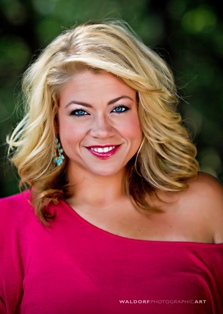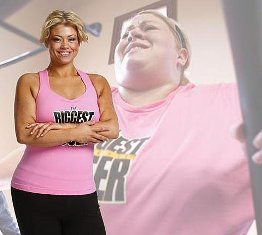Ashley Johnston's story sounds like the American dream. Girl meets weight-loss challenge and her dream boy on NBC's The Biggest Loser. After losing almost half her body weight on the reality game show, girl moves to sunny California to live happily ever after with dream boy. At least, that's the reality-TV version of the story.
In reality, although massive weight loss like Johnston's (183 pounds) and her boyfriend Koli Palu's (215 pounds) often boosts self-esteem and body image, the inevitable loose, sagging skin and likely weight fluctuations can have quite the opposite effect. What's more, "phantom fat," the phenomenon where waist watchers lose weight but still see themselves as fat, can make getting comfortable in looser skin that much more challenging.
Whether weight loss is a result of old-fashioned diet and exercise or newer medical procedures like gastric bypass, the best bet that Johnston, Palu and other big-time "losers" have for further improving their body appearance and image is a plastic-surgery procedure called "body-contouring." Contrary to popular belief, however, surgery is not a cure-all. While body contouring rids the body of excess skin, it may leave large, visible scars and skin irregularities, if not body-shape deformities.
Since starting this body-image series, I've been wondering how Johnston was doing two years after the show, and one year after our initial interview. If you can't picture the runner-up of The Biggest Loser season nine, this determined Southern belle was the one who went from 374 to 191 pounds in seven months. You know, the blonde, blue-eyed darling of the mother-daughter team.
Funny thing, before I reached out to Johnston for her thoughts on body image, she reached out to me. After reading about this body-image series in my e-newsletter, An Encouraging Word, she emailed: "Even after losing 183 pounds, my body image is still a struggle. I went from a size 28-10, and still felt fat. I have never been happy with my body. I will say my self-image improved drastically, but the self-beat-up on my image never went away."
Her discouraged email compelled me to see how I could help, as well as request another interview so that Johnston could help others who struggle similarly. What follows are questions and answers from my recent heart-to-heart with the Biggest Loser who lost more weight than any female contestant in the show's history.

Q. Today, we're talking about body image, which you say is a huge, hidden issue for you and other contestants. What can you tell me about that?
A. Whether you're on a national TV show or at home, I think a lot of women and men have body-image issues. Being on the show definitely magnifies it. We are under a microscope; everyone's watching our bodies. Body image is one thing I've struggled with before the show, during the show and now. Before the show, my body-image issues were really, really bad. I was 374 pounds and felt disgusting. I didn't want to go out of the house, although I did. I'd hear people making comments about me, which didn't help. Actually, I've had body-image issues since I was very young. When I was 6, I had my tonsils taken out, and all of a sudden, I was able to breathe and sleep better, started growing and became overweight. I started noticing I looked different than the other girls my age. I had to shop in a different clothing section. So it started very young and it kept with me since then.
Q. How did losing close to 200 pounds affect your body image?
A. I did feel more beautiful, more attractive. I still was not at my goal weight, but for the first time, I was finally able to shop in regular stores. I felt I looked "normal" if you will. I still felt when I stood in front of the mirror, my body was not perfect. Also, when you lose a lot of weight really quickly, you have to get surgery because you do have excess skin. That [excess skin] creates an issue for a lot of people -- myself and other people on show -- with body image.
Q. What was it like to look in the mirror and see all that extra skin?
A. It was really tough. I worked so hard to get to 191, and I still didn't look good naked. I still wear undergarments to make sure everything stays in. I still felt like I was 374 pounds sometimes. If I was walking past a mirror, I really wouldn't recognize myself at times. It takes a little bit for your mind to catch up with your body.
Q. You say the weight loss never stopped the self-beat-up. What do you mean by that?
A. It's a little voice in your head that tells you things about yourself all day long. That little voice was constantly cutting me down: "You're so fat. You'll never have that perfect body." I was afraid I'd gain back the weight and be miserable again. I was a size 10, but I was still considered obese [on the Body-Mass Index]. At 5'5" they say I should be 135. I have no desire to be 135. I like to be fit, healthy and have muscle.

Q. I imagine you never expected to feel fat after losing so much weight? How had you hoped to feel?
A. The hope was that I would finally have that perfect body, that I would feel comfortable naked, in a bathing suit or more form-fitted clothing. I will say I did come a long way. I was happier, healthier, more active. I was living my life finally. But I still had that issue with body image. When I'd go work out, I was really self-conscious about my arms. I wore a sleeveless dress in the finale, but I never wore sleeveless after the show.
Q. How does your body image compare to your mom's?
A. My mom lost 99 pounds and has maintained [her weight] extremely well. She also has body-image issues that stem back for her as well. She was never a size zero, but she's naturally thin. Her [issues] started after she had children, and her weight started to spiral out of control. She always felt the pressure of being thin and was constantly cutting herself down. Since the show, we've had our ups and downs with our weight. Now, we'll call each other, and sometime the conversation is just beat-up: "I can't believe I gained weight," she says. "The egg is starting to come back." That's what we called our stomachs before we went on the show. She has only gained a little weight back, but she still has that negative self-image.
Q. How have you done with weight maintenance?
A. It has been a struggle. I did extremely well with maintaining my weight for six months after the show. I didn't gain one pound. Even though I felt strong and proud of myself, I still had that little voice: "You're still not good enough" I started getting discouraged that I never reached my goal weight, and that has led to me to put on some weight. I'm working on getting it back down. I'm trying to encourage other women to do the same. I'm working on an athletic line with a designer for regular size to plus size. It's all about encouraging women to feel good while they work out. There are positive quotes on the inside [of the athletic wear] that say: "You can do all things," and "You are beautiful."
Q. How has your body dissatisfaction affected your diet and exercise regimen?
A. I started skipping workouts because I was mentally tired of fighting that little voice. That [voice] has contributed to some of the weight gain. I got to the point when I had gained 20 pounds and didn't want to go to the gym. I felt that people were going to be so disappointed in me. They were going to think I'm huge. Once I started getting discouraged and embarrassed to go [to the gym], it really deterred me from getting to my goal weight.
With the eating, I've really kept a consistent diet. I have never gone back to fast food. I've never gone back to drinking all the time and partying. But I did start to realize: "Oh, there's that emotional eating coming up again." When the beat-up started getting bad, I just wanted something [high-calorie to eat]. From the show, I've learned to at least recognize it [emotional eating]. But until I get that negativity out of my head, it's always going to be a struggle. It's tiring to always prove myself wrong.
Q. That does sound tiring. Any idea how you're going to put an end to this struggle?
A. I'm doing a lot. I went through a wonderful program called New Era. Actually, Koli and I went through it together. It completely changed our lives in a huge, positive way. That negative voice is still waiting for me when I wake up in the morning, but I try to look at the positive side of things. Also, I am eating healthy. I have an exercise routine. Today I went to Bikram [yoga]. It's nice to lay there and give myself positive affirmations. I literally feel happier when I leave.
Q. Anything else you want to say that I didn't ask?
A. Body image is an issue not only for people struggling with weight. Koli and I both struggle. I have friends who don't have an ounce of fat on their bodies, but they still have body-image issues. It probably has something to do with how we view ourselves and others. I just don't have a solution. I'm still hoping to find the "CURE" and find that girl again that gave 100 percent to herself in order to change!
If you're wondering if your inner critic is undermining your best intentions, be sure to take my quiz in the August issue of O: The Oprah Magazine. You'll learn practical tips on how to be kinder to you, if not experience an Oprah-esque "aha" moment.
Before-and-after photo used with permission by The Biggest Loser.
Johnston headshot by Waldorf Photographic Art.
Jean Fain is a Harvard Medical School-affiliated psychotherapist specializing in eating issues, and the author of "The Self-Compassion Diet." For more information, see www.jeanfain.com. Got comments on any of the above? Share your two cents in the Comments section.
For more by Jean Fain, L.I.C.S.W., M.S.W., click here.
For more on weight loss, click here.